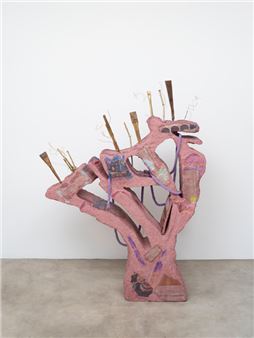Os Monstros de Babaloo
Fortes DвҖҷAloia & Gabriel is pleased to present вҖҳOs Monstros de BabalooвҖҷ, a group show curated by Victor Gorgulho, including works by 33 contemporary artists from 1960 to today. The exhibition references the 1970 film of the same name by director Elyseu Viscoti (Rio de Janeiro, 1939-2014, grandson of painter Eliseu Visconti), about a grotesque, dysfunctional family ruling over a tropical paradise south of Ecuador.
The synopsis of ViscontiвҖҷs film could easily mirror the Brazilian political scene in 2021: Babaloo, the mythical island, is inhabited by creatures of all kinds: these are convulsive bodies in a continuous trance, delirious rats and zombies wandering in the incessant sunlight that never sets. The current exhibition references and reveres the political allegory of ViscontiвҖҷs film, which at the time was censored by the military regime, and since then has rarely been shown in a public context.
Transgressive in form and content, the films of the so-called marginal Brazilian cinema came to expand the more rigid structures (although no less inventive) of the Cinema Novo films of the early 1960s. The radical invention of the Brazilian audiovisual is today remembered for some of the most ingenious allegories about Brazil, often questioning and complexifying contradictory notions of Brazilianness and tropicality.
Suggesting narrative, semantic, and visual tensions between artists, works, and productions from the 1960s to today, the group show articulates a web of blurred temporalities and unsuspicious approximations. A colorful, cruel tropical paradise, forged between farce and fiction, beauty and violence, joy and horror.

Recommended for you
Fortes DвҖҷAloia & Gabriel is pleased to present вҖҳOs Monstros de BabalooвҖҷ, a group show curated by Victor Gorgulho, including works by 33 contemporary artists from 1960 to today. The exhibition references the 1970 film of the same name by director Elyseu Viscoti (Rio de Janeiro, 1939-2014, grandson of painter Eliseu Visconti), about a grotesque, dysfunctional family ruling over a tropical paradise south of Ecuador.
The synopsis of ViscontiвҖҷs film could easily mirror the Brazilian political scene in 2021: Babaloo, the mythical island, is inhabited by creatures of all kinds: these are convulsive bodies in a continuous trance, delirious rats and zombies wandering in the incessant sunlight that never sets. The current exhibition references and reveres the political allegory of ViscontiвҖҷs film, which at the time was censored by the military regime, and since then has rarely been shown in a public context.
Transgressive in form and content, the films of the so-called marginal Brazilian cinema came to expand the more rigid structures (although no less inventive) of the Cinema Novo films of the early 1960s. The radical invention of the Brazilian audiovisual is today remembered for some of the most ingenious allegories about Brazil, often questioning and complexifying contradictory notions of Brazilianness and tropicality.
Suggesting narrative, semantic, and visual tensions between artists, works, and productions from the 1960s to today, the group show articulates a web of blurred temporalities and unsuspicious approximations. A colorful, cruel tropical paradise, forged between farce and fiction, beauty and violence, joy and horror.
Artists on show
- Adriana Varejão
- Aleta Valente
- Antonio Henrique Amaral
- Carlos Vergara
- Cristiano Lenhardt
- Diambe
- Erika Verzutti
- Ivens Machado
- Jac Leirner
- Júlio Bressane
- Leda Catunda
- Lenora de Barros
- Luisa Brandelli
- Luiz Roque
- Moisés Patrício
- Mulambö
- Rafa Bqueer
- Rafael Alonso
- Roberto Magalhães
- Rodolpho Parigi
- Rodrigo Hernandez
- Rodrigo Matheus
- Rodrigo Torres
- Rogério Sganzerla
- Rubens Gerchman
- Tadáskía
- Teresinha Soares
- Tiago Carneiro da Cunha
- Tiago Mestre
- Victor Arruda
- Wanda Pimentel
- Yuli Yamagata















